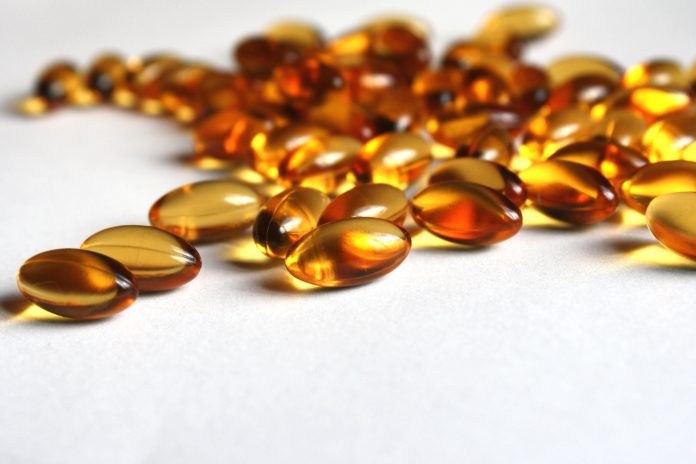Fish oil is one of the most frequently ingested dietary supplements in any of various forms whether liquid, pill or capsule. Discussions of fish oil benefits abound on the internet because of one key essential fatty acid it contains – omega 3. In addition, it typically contains a percentage of the vitamins A and D.
Omega-3s are vital for many body processes ranging from healthy brain function to the prevention or control of heart disease. Unfortunately, they are not produced in our body. What’s more, the Western diet has substituted much of the Omega-3 with Omega-6 or other fats.
The chief omega-3s fish oil contains are eicosapentaenoic acid (EPA) and docosahexaenoic acid (DHA). Good dietary sources of Omega-3s include salmon, anchovies, mackerel, sardines, trout and herring. In the white fish cod, a good amount of oil is there in the liver. Eggs are another animal source but you should ideally go for those that are rich in Omega 3.
Table of Contents
Fish Oil Benefits Men and Women, Children and Seniors
A number of studies point to the manifold health benefits that fish oil has to offer to all age groups.
1. Can Help Alleviate Certain Mental Health Disorders
There are studies which indicate that countries with healthier diets, meaning those with more fish and vegetables are associated with lesser prevalence of depression compared to their western counterparts. Research also shows that people with some types of mental disorders have lower levels of Omega 3 in their blood.
Fish oil supplements could reduce the probability of a person at risk of a psychiatric disorder, from developing it. Supplementation with this oil could also alleviate certain symptoms of bipolar disorder and schizophrenia.
2. Reduced Triglyceride Levels
Much research points to fish oil being able to achieve a 20 to 50 percent reduction in triglyceride levels. The higher the dose, the better is the reduction. To get this benefit, it is advisable to prefer prescription fish oil over their non-prescription counterparts. This is because the latter often contain less percentage of omega-3 than the former.
Omega-3 is also associated with a mild improvement in HDL or good cholesterol. However, the fatty acid also increases LDL or bad cholesterol as well.
3. More Benefits for the Heart
Higher intake of dietary fish oil is associated with a reduced possibility of heart failure. In addition, early research indicates that fish oil supplements could alleviate serious outcomes in patients already beset with heart failure. Thus, there could be reduced hospital admissions and longer life.
With respect to arterial plaque, fish oil can prevent it as well as increase the safety and stability of existing plaques.
In small doses, fish oil helps to bring down high blood pressure. It can possibly reduce deadly arrhythmias (abnormal heart rhythms) in at-risk people.
It is good to have one or two servings of non-fried fish each week.
4. ADHD Disorder
Omega 3s form a major portion of the brain and are indispensable for proper brain function. Thus, getting the oil in adequate amounts may be necessary to prevent the onset of behavioral disorders at a very young age.
A few small studies have shown that fish oil supplements may boost attention and behavior and decrease hyperactivity in children below 12 years of age. Fish oil could also curb aggression and impulsiveness in children which would, in turn, be advantageous in early life learning.
Some research indicates that consuming a certain supplement containing evening primrose oil and fish oil benefits children affected with DCD (developmental coordination disorder). It supposedly contributes to better spelling, reading and behavior when given to such children ( age group 7 to 12).
5. Reduced degree of cancer
There is an indication that women who habitually consume approximately two servings weekly of fatty fish have a decreased risk of getting endometrial cancer. There is also evidence of a link between a high intake of Omega-3s and a lower degree of some cancers. However, the evidence is not solid enough and applies to breast, colon, esophagus, ovary and prostate cancer among others.
Fish oil in high doses is also associated with a slowing down of weight loss in cancer patients. Some researchers are of the opinion that the slowing down is because of the mood-enhancing power of fish oil.
6. Great for Eye Health
Fish oil is used to alleviate symptoms of glaucoma, dry eyes,
age-associated macular degeneration, and cataracts. Some research points to sufficient DHA consumption in the diet protecting people from age-associated vision loss.
7. Relief in Rheumatoid Arthritis
Research implies that fish oil supplementation could help decrease pain, alleviate joint tenderness and improve morning stiffness associated with rheumatoid arthritis. The relief may not be enough but could still help reduce dependence on anti-inflammatory drugs.
8. Benefits for Female Health
Some women consume fish oil to avoid painful periods. This may be taken alone or in combination with vitamin E or B12. The oil also helps with breast pain and pregnancy-associated complications such as high blood pressure (preeclampsia), slow infant growth, early delivery, and miscarriage.
Omega-3 intake during pregnancy may boost cognitive, motor and sensory development in the fetus. It may also decrease the possibility of developing post-partum depression.
9. Osteoporosis
Research shows that consuming fish oil alone or in combination with evening primrose oil and calcium increases spine and thigh bone density in elderly people afflicted with osteoporosis. Bone loss will also slow down.
10. Psoriasis (Itchy and scaly skin)
Some evidence points to a link between intravenous administration or topical application of fish oil to the alleviation of psoriasis symptoms. Oral intake of fish oil does not provide these benefits.
11. Advantages to the kidney
Fish oil benefits the kidneys too. Long-term intake of fish oil can help to preserve kidney function in people with acute IgA nephropathy (Berger’s disease). It may be most beneficial in the IgA nephropathy patients with high percentages of protein present in the urine.
Fish oil may avert kidney damage in patients on the medication Cyclosporine. This drug is used to reduce the probability of organ rejection following an organ transplant. The oil may also enhance the kidney’s working in the recovery period if the organ is rejected after taking Cyclosporine.
Other medical conditions for which fish oil may be beneficial include multiple sclerosis, Reynaud’s syndrome, migraine, chronic fatigue syndrome, obesity, diabetes, and asthma.
Fish Oil Benefits Bodybuilding
You have already seen that fish oil is great for the heart. A healthy heart is essential if you are going to be engaging in intense workout sessions. Here are some other reasons why it is smart to supplement your bodybuilding with fish oil supplementation.
1. Hastens Post-Workout Recovery
Studies have shown that supplementing the diet with fish oil rich in omega-3 is associated with less inflammation and pain and a better range of motion compared to that achieved with a placebo. The oil can also hasten the repair of tiny muscle tears that follow a workout. A faster recovery means you can train at a higher intensity and more frequently.
2. A Good Complement to Weight Loss Efforts
There is a link between fish oil pills and increased metabolism. Dieting may unintentionally cause you to lose lean muscle and not fat. However, fish oil helps you both increase muscle mass as well as burn fat.
Research also indicates that fish oil makes a person feel full faster. So, you are less likely to go for second or third rounds of eating when you supplement your diet with this oil.
3. A Healthy Brain is Yours
Omega-3s are indispensable for proper brain function. Research indicates that EPA and DHA in fish oil can boost cognitive performance. What’s more, Omega-3s may possibly enhance reaction time, decision making and brain function in healthy people. However, another study showed that high dosages of Omega-3 do not avert cognitive deterioration in older women. So the supposed brain benefits are open to debate.
4. Better Glycogen Storage
Fish oil boosts the body’s ability to utilize fat for fuel. In this way, it assists the body with storing greater amounts of muscle glycogen. This will enable you to make better use of your stored fat for energy. You can keep your stored glycogen in reserve for more demanding exercises.
Fish Oil Dosage
The recommended daily intake of DHA and EPA combined is 250 to 500 mg. Usually, 1000 mg of fish oil provides approximately 300 mg of DHA and EPA together.
For women, the RDI for omega-3 is 1100 and for men, it is 1600.
When using for a disease or ailment, the dosage of fish oil would vary depending on the condition for which it is used. For example, to reduce triglyceride levels, the usual dosage is 1 to 4 grams every day. In general, adults can safely consume a maximum of 3000 mg fish oil every day.
Side Effects and Precautions
Though fish oil benefits are many, it is worth being mindful of possible side effects and safety concerns. First of all, it is best to avoid the oil if you are allergic to soybeans or fish.
You will need emergency medical attention should you display any of these symptoms of an allergic reaction – difficulty breathing, hives, or swelling of the face, throat, tongue or lips. Other serious side effects for which you should call a doctor are:
- Uneven heartbeats
- Chest pain
- Nosebleeds
- Body pain or flu-like symptoms
- Fever
Some of the minor side effects are:
- An unpleasant or unusual taste in the mouth
- Mild skin rash
- Nausea
- Indigestion or upset stomach, maybe loose stools
- Back pain
In many cases, freezing the fish oil supplements or taking them with meals can reduce the minor side effects.
Certain dietary sources of fish oil are best avoided because they may have high mercury content. This includes shark, tilefish, king mackerel, and swordfish. Shrimp, salmon, catfish, Pollock and light canned tuna are safer dietary sources of fish oil.
Fish oil in high doses may decrease the body’s immunity. So, this is a matter of concern for people under medication to suppress their immune system (as in an organ transplant). The elderly should also be careful and only take high doses under a doctor’s recommendation.
Another concern is that fish liver oils have high concentrations of the vitamins D and S. So if too much is consumed, it could be poisonous.
Possible Drug Interactions
Though the manifold fish oil benefits are reason to get adequate supplementation, be wary that the oil can interact with certain drugs. Some examples are given below and the list is not complete. To be on the safe side, it is best to inform your doctor about all the medications you are taking before you start taking fish oil supplements.
- Contraceptive drugs – These may interfere with how fish oil works on triglycerides.
- Medication for high blood pressure – This interaction may cause blood pressure levels to go down too low
- Orlistat (Alli, Xenical) – If this weight loss drug is taken with fish oil, it may reduce absorption of the latter. It is advisable to keep a gap of two hours between both drugs.
- Anti-platelet and anti-coagulant drugs, supplements and herbs. These may decrease blood clotting. So taking them along with fish oil could raise the chances of bleeding.
- Vitamin E – Fish oil may decrease levels of Vitamin E.
Refrain from consuming alcohol when you are on fish oil supplements. Alcohol can cause triglyceride levels to soars, thereby contributing to a worsening of your condition. Additionally, talk to a physician or pharmacist if you have any of these conditions:
- Diabetes
- Pancreas disorder
- Liver disease
- An underactive thyroid
Final thoughts
These were some of the ways you can use fish oil and it can give you benefits. Make sure you know all about the suggested dosages and only have what your body permits.








